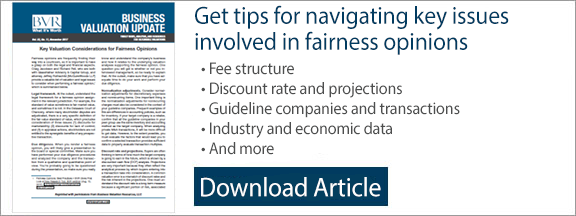Performing a fairness opinion: Top valuation and legal issues you should consider
Fairness opinions are frequently finding their way into a courtroom, so it is important to have a grasp on both the legal and financial aspects. BVR asked Craig Jacobson and Richard Peil, both of GlassRatner Advisory & Capital Group, and attorney Jeffrey Rothschild of McGuireWoods to provide a list of the key valuation and legal issues to consider when performing a fairness opinion. The following is an excerpt from an article originally published in BVR’s Business Valuation Update. Download the full article.
Key factors to think about as you go into a fairness opinion
Legal framework
At the outset, understand the legal framework for a fairness opinion assignment in the relevant jurisdiction. For example, the standard of value sometimes is fair market value, and sometimes it is not. In the Delaware Court of Chancery, where many stockholder disputes are adjudicated, there is a very specific definition of the fair value standard of value, which precludes consideration of three issues: (1) discounts for marketability; (2) discounts for lack of control; and (3) in appraisal actions, stockholders are not entitled to the synergistic benefits of any prospective transaction.
Due diligence
When you render a fairness opinion, you will likely give a presentation to the board or special committee. Make sure you have performed your due diligence procedures and analyzed the company and the transaction from a qualitative and quantitative point of view. You will probably be questioned during the presentation, so make sure you really know and understand the company’s business and how it relates to the underlying valuation analyses supporting the fairness opinion. One question you will get is whether or not you interviewed management, so be ready to explain that. At the outset, make sure you have adequate time to do your work and perform your due diligence.
Normalization adjustments
Consider normalization adjustments for discretionary expenses and nonrecurring items. One important thing is the normalization adjustments for nonrecurring charges must also be considered in the context of your guideline companies. Frequent examples of this are differences in accounting policies, such as for inventory. If your target company is a retailer, confirm that all the guideline companies in your peer group use the same inventory and accounting method as the target company. When analyzing private M&A transactions, it will be more difficult to get data. However, to the extent possible, you must evaluate the factors that would lead you to confirm a selected transaction provides sufficient data to properly evaluate transaction multiples.
Other important considerations
Explore additional issues to consider when performing a fairness opinion in the complete Business Valuation Update article, “Key Valuation Considerations for Fairness Opinions.”

